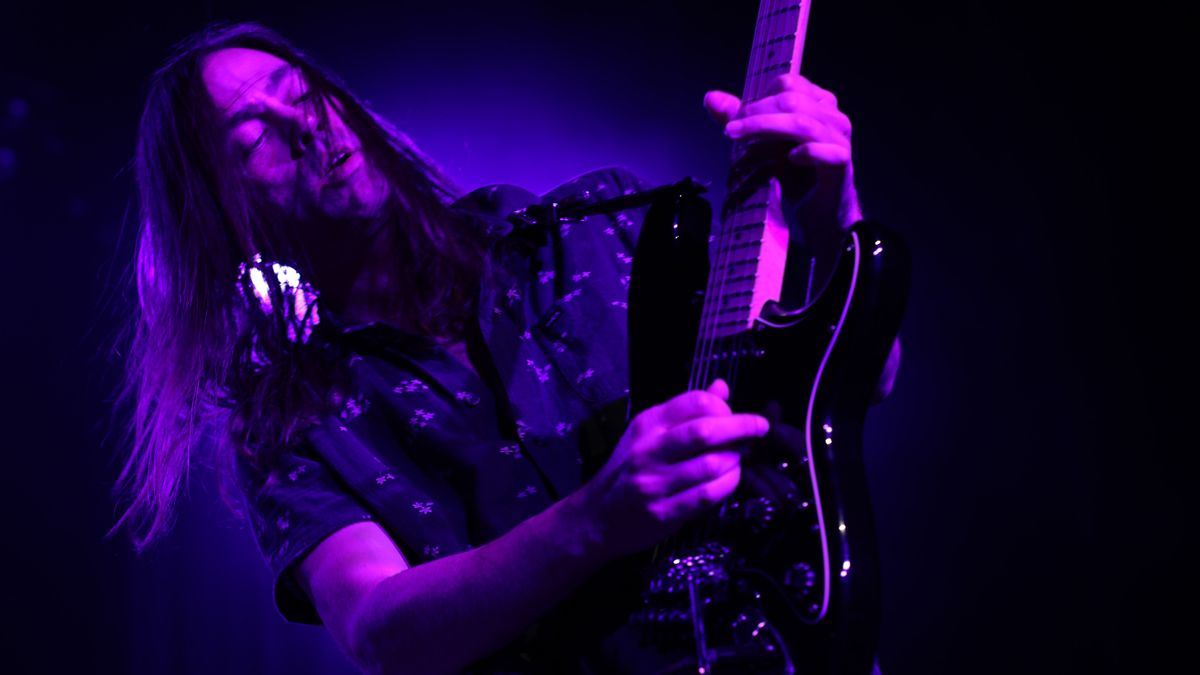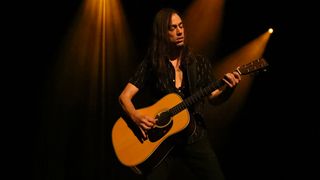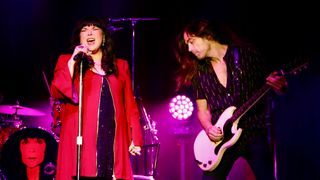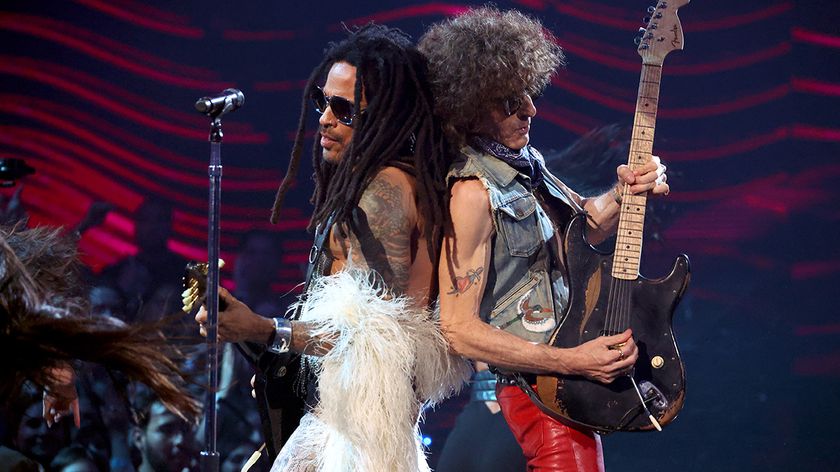“Chris Cornell said I created ‘a symphony of chaos’ – it was his favorite thing about the track. It meant even more because he was gone less than a year later”: Meet Ryan Wariner, go-to session guitarist for everyone from Dave Mustaine to Ann Wilson
He may be a Nashville session cat, but Ryan Wariner doesn’t play country. Music City’s resident rock guitar enthusiast reveals how he ended up playing slide with Megadeth, what it takes to perform a last-minute show with Gene Simmons, and why he sought a different path to his father, country legend Steve Wariner

With a dad like country great Steve Wariner, it’s no surprise that Ryan Wariner ended up flanking music royalty – including the likes of Gene Simmons, Dave Mustaine, Chris Cornell, and Ann Wilson.
But while Wariner shares his dad’s passion, he doesn’t share his affinity for chicken pickin’ licks, instead choosing to rock out – though his dad did influence him to pick up the guitar in the first place: “The first thing was seeing my dad play electric guitar,” Wariner says. “I thought it was the coolest thing, and I wanted one.”
“I had toy guitars as a kid in diapers, so I guess I was collecting guitars even then,” he laughs. “And I remember hearing White Room, and it being like a lightning bolt. I begged my parents for an electric guitar and never looked back.”
The youngster soon traded in his toy guitars for a real one, which his dad loved: “My dad was all about it,” Wariner says. “But he pushed me in the direction he went. I was into rock from the start.”
Through his father is a bona fide legend, Wariner erred toward his mother’s music taste, shaping his career: “The drive for the rock thing came from my mom,” he says. “She doesn’t have any musical talent but had that taste.”
He continues, “When I was nine, she said, ‘Have you heard Eddie Van Halen?’ I said, ‘No,’ and she said, ‘Oh, you’re going to like Eddie.’ She was right, and I never went down my dad’s path. I love it when I hear it, but all I ever cared about was rock.”
These days, Wariner is an established Nashville session player, though not for the same reasons as his dad. He’s bucked the trend in a city known for its twang by injecting power chords into the mix.
Get The Pick Newsletter
All the latest guitar news, interviews, lessons, reviews, deals and more, direct to your inbox!
He’s become a go-to hired gun in situations that call for rock delivered through a Marshall stack, leading to a spot in Ann Wilson of Heart’s solo band: “Ann was working with Tom Bukovac, and he’d let her know he couldn’t do it anymore. So, word traveled through the grapevine, and eventually, my friend Rob McNelly told them I’d be good for the gig.”
“So, they called me,” he continues. “We jammed on some classic Heart songs, like Crazy on You and Barracuda, and it went great. The gig was a no-brainer, and really, the gig of a lifetime. I don’t just play shows; I get to be a band member and help write songs. I’m the luckiest guy, and it keeps getting better.”

One of your highlights is working with Gene Simmons. How did that happen?
“I got that gig through some friends of mine who live in Nashville, Jeremy Asbrock, and Phil Shouse. They were playing with Gene and had some gigs they couldn’t do. But I wasn’t a diehard Kiss guy like them; I knew the staples.
“So, when I got there, the preparation was knowing that I had to play the songs exactly as the fans expected to hear them. Jeremy and Phil were keyed in on every nuance, and I needed to be, too. That was the most I ever dug in regarding playing everything as it was on the record.”
Was Gene easy to get along with?
“I didn’t meet Gene until the afternoon before the first show when he came into the dressing room to hang out. He brought a bass, went through a few things, and said, ‘Wow, you did your homework.’ After that, we did the show, and he spent the rest of the night telling us stories. Despite having a big personality, Gene was very kind and gracious.”
Tell me about playing slide guitar on Megadeth’s Poisonous Shadows.
“I was playing a show with my dad in Nashville – I was playing slide – and Dave [Mustaine] was there. So, afterward, he got a hold of me, saying, ‘I’m in Nashville working on a record [Dystopia], and I have a song that I don’t want any shredding on,’ and then he said, ‘I need some slide. Would you come down and play?’”
Why did Dave choose you?
Dave Mustaine said, ‘I love your intonation and touch on the slide’… Eighth grade me would never think something like that would happen
“He said, ‘I love your intonation and touch on the slide,’ which was terrific. It was an immediate ‘yes’ from me, as I’d loved Megadeth since I was a kid. I can tell you that eighth grade me would never think something like that would happen.”
What gear did you use?
“The same Gibson Les Paul I’m using with Ann Wilson, plugged into Dave’s rig. I’ve had many Custom Shop Les Pauls, but there’s something about that one. But anyway, Dave gave me the melody, and we did it in about 20 minutes, and said, ‘Okay, let’s go to lunch.’ We hung out, and he was very appreciative, but they forgot to add me to the album credits… but it was still amazing.”
How did you find yourself in the studio with Chris Cornell?
“The Chris Cornell thing was one of the best experiences ever. Chris’s voice was unreal, and Soundgarden was my favorite band of that era. The project was a Johnny Cash thing called Forever Words, and Chris was there to cut this track, You Never Knew My Mind, comprised of unfinished [Cash lyrics] from the ‘70s. Chris’s track was dark and slow-paced, and they chose me because they didn’t want a typical Nashville session guy; they wanted a rock guy.”
Was it nerve-wracking stepping into the studio with Chris?
“Well, my friends sold them on me, telling them, ‘Ryan is the guy, and he’s a rock guy.’ So, I just showed up with a couple of guitars and got set up. But Chris was super-cool and friendly, and within 10 minutes, we were rolling. I tried to treat it like any other session, started to think about the arrangement, and stayed ready.”
And was it easy to catch Chris’s vibe?
I was so focused that I didn’t even notice Chris entering the booth. But when he started singing, I heard it through the headphones and got cold chills
“I was sitting in this chair and getting dialed in, and we did the first take with headphones on. I was so focused that I didn’t even notice Chris entering the booth. But when he started singing, I heard it through the headphones and got cold chills. I almost stopped playing because I’d never heard his voice like that. After that, we cut the acoustic stuff with an old Gibson J-45 in two takes and then did overdubs.”
You laid down some incredible electric work there, too. Was that with a Strat?
“It was. It was a maple neck ’59 Strat that my uncle gave me. It’s a guitar that my dad also used a lot in the ‘80s, so it’s been on several famous records. My buddy Stanton [Adcock], from The Wallflowers, actually played that guitar once and said, ‘Dude, I have to stop – I’m never gonna want to play my guitars again!’”
How did you create the spooky vibe throughout the track?
“I pulled out my Prescription Electronics Experience Fuzz, my favorite secret weapon in the studio. I used that to make the spooky sounds, with a ton of delay and reverb. It’s to the point that you could barely tell what I did, and it sounds like weirdness permeating the track.”
Did you receive any feedback from Chris?
“I found out later that what I did there was Chris’s favorite thing about the track. Chris had said I created ‘a symphony of chaos,’ which is crazy because I was just trying to stay above water. Hearing that meant the world to me. It meant even more because he was gone less than a year later. Some days are like that, where they’re just pure magic.”

You’ve mentioned a few guitars you’re partial to, but what amps do you rely on?
“I’m a real amp-head, man. I’ve been collecting vintage amps forever. My favorite is a purple ’68 100-watt Marshall Plexi. It’s the holy grail, and I’d never trade it. I’ve had a ton, but that one is the one that I can’t live without. I randomly found it on eBay, took a chance, and it paid off.
“It’s got the old Van Halen Sylvania tubes, and it’s my favorite color, so it’s an absolute powerhouse. I’ve got old Supros, Vox AC30s, and used old black-panel Fenders a lot, but I always seem to go back to my purple Marshall.”
What are your greatest challenges as a session player?
“Man, the biggest challenge is not getting stuck in my head. Not all sessions are created equal regarding their coolness, but that doesn’t matter, because everyone in the room is top-notch. And that’s another thing I need to overcome: feeling like I’m not as good as the others in the room. I have to remember that I wouldn’t be there if I couldn’t keep up. I often remind myself that I’m good enough to be there.”
And what’s your greatest triumph?
“The session with Chris Cornell. The fact that we nailed it in two takes while dialing in the sound, and that the fuzz thing was Chris’s favorite meant a lot.
“But also, working with Ann Wilson. Touring and recording with a legend is not something I take lightly. I’m very proud of Another Door because some of that stuff is my favorite to play live; everyone reacts so well to it. So, working with Ann is deeply rewarding. It’s a high-water mark.”
- For more information, head to RyanWariner.com.
Andrew Daly is an iced-coffee-addicted, oddball Telecaster-playing, alfredo pasta-loving journalist from Long Island, NY, who, in addition to being a contributing writer for Guitar World, scribes for Bass Player, Guitar Player, Guitarist, and MusicRadar. Andrew has interviewed favorites like Ace Frehley, Johnny Marr, Vito Bratta, Bruce Kulick, Joe Perry, Brad Whitford, Tom Morello, Rich Robinson, and Paul Stanley, while his all-time favorite (rhythm player), Keith Richards, continues to elude him.

“We had 15 minutes left, and it was time to go… I just started playing that riff. Then Lenny goes, ‘Whoa, what’s that?’” Lenny Kravitz guitarist Craig Ross reveals the serendipitous roots of a Kravitz classic

“The concept of the guitar duel at the end was just appalling”: Crossroads is an essential piece of '80s guitar lore, but not every guitar legend was a fan of the film











